A Guide to Buying the Perfect Bread Maker
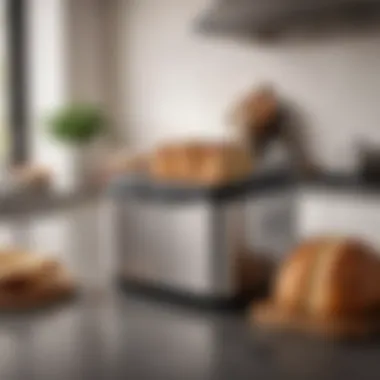

Intro
When it comes to the delightful art of baking, few kitchen gadgets can rival the convenience of a bread maker. This handy device not only allows you to create freshly baked bread at home but also provides you with an array of options regarding flavors and textures. The rising trend of home baking has ignited the curiosity of many food lovers. With so many models, brands, and features available, knowing where to purchase a bread maker has become essential for culinary enthusiasts and home bakers alike.
In this article, we’ll journey through the myriad landscapes of bread maker options, examining where to find the best choices. From online platforms to local appliance shops, understanding the ins and outs of sourcing a bread maker is crucial. Moreover, we’ll consider key elements such as pricing, essential features, and customer support. This knowledge ensures you're not just buying a machine, but investing in a gratifying and delicious baking experience.
Let's dive into the specifics of this buying guide and explore all the angles of purchasing a bread maker.
Prologue
Understanding where to purchase a bread maker can be quite illuminating for anyone passionate about crafting homemade bread. Baking bread is not just a culinary task; it’s a delightful journey that elevates the kitchen experience. But as with any journey, having the right tools is crucial. This article is dedicated to guide you through the intricate paths leading to the best spots for picking up a bread maker.
When it comes to selecting a bread maker, it isn't simply about choosing any machine that fits your budget. Several factors should come into play, from understanding the varying types of machines available to assessing features that fit your specific baking preferences. With this article, we aim to provide clarity in what might otherwise seem like a daunting decision.
What's in it for you? Well, first off, you’ll learn about the importance of freshness that comes with homemade bread. There’s nothing quite like pulling a loaf of warm bread, made with ingredients you trust, from your very own bread maker. This article also emphasizes versatility—considering how customizable recipes can be, allowing you to cater to dietary needs or experimenting with flavors.
Moreover, there’s the convenience factor. Imagine being able to bake bread while juggling work, reading your favorite book, or even tending to your family. A bread maker serves as your assistant in this regard, automating processes while you focus on what really matters.
Investing a bit of time to understand your options can save you from future frustration and disappointment. An informed decision leads to satisfaction with your final choice.
In this article, we will explore various purchasing avenues, including both online retailers and local shops. Each has its own set of advantages and drawbacks, which we’ll thoroughly analyze. By the last word on this page, you'll be equipped not just with knowledge but with confidence in your ability to pick the right machine. Whether you are a novice baker or a seasoned pro, knowing where to buy a bread maker tailored to your needs is invaluable.
Are you ready? Let’s dive deeper!
Understanding Bread Makers
Bread makers are more than just kitchen gadgets; they symbolize the intersection of tradition and modern convenience in home baking. Understanding bread makers is essential for potential buyers because it sets the groundwork for an informed purchasing decision. Not every bread maker is created equal, and knowing the ins and outs can enhance your baking experience exponentially.
A bread maker is essentially an appliance that automates the process of baking bread. It combines the mixing, kneading, rising, and baking stages all in one unit. With technological advancements, many models now come packed with features that allow for unique customization and options that weren’t available in manual processes. Thus, understanding bread makers not only relates to what they are but also how they can be tailored to suit individual needs and preferences.
What is a Bread Maker?
A bread maker’s primary function is to simplify the bread-making process. Generally, it consists of a bread pan, a kneading blade, a heating element, and, importantly, a control board where users select their desired settings. When the ingredients are properly added, pressing a few buttons sets the bread maker into motion, automating what used to be a labor-intensive job.
Most bread makers are designed to handle various types of bread, whether it’s a classic white loaf, whole grain, or even gluten-free offerings. Understanding the specifications and capabilities of different models allows consumers to match them closely with their desired bread outcomes.
Benefits of Using a Bread Maker
Freshness and Flavor The most discernible advantage of using a bread maker lies in the freshness and flavor of homemade bread. Unlike store-bought bread, which can sit on shelves for days, bread made in a bread maker bursts with flavor right out of the oven. With the ability to use fresh ingredients and avoid preservatives, bakers can create loaves that are not only chewy and crusty but also free from the artificial aftertaste associated with mass-produced goods.
"Bread making at home isn’t just about eating; it’s about enjoying the process and celebrating the flavors at every bite."
Convenience The convenience of a bread maker cannot be overstated. In a busy world where time is often a luxury, setting up a bread maker is almost effortless. Just toss in the ingredients, choose a program, and let it do the work while you attend to other matters. The time-saving aspect of not having to knead the dough or monitor the baking process makes it an appealing choice for those with hectic schedules.
Customization of Ingredients Customization is a game-changer for the health-conscious or those with dietary restrictions. Bread makers allow you to play around with ingredients, whether you prefer organic flour, reduced sugar, or the addition of seeds and nuts. This level of control ensures that every loaf aligns with your dietary needs and personal tastes. Using a bread maker in this regard gives you freedom that commercial bread simply does not offer.
Factors to Consider When Buying a Bread Maker
When it comes to choosing the right bread maker, navigating through the myriad of options can feel like finding a needle in a haystack. This section aims to root through the clutter and highlight key elements to weigh before making that pivotal investment.
Size and Capacity
Size matters a lot when purchasing a bread maker. It’s not just about the physical footprint it’s going to take up on your countertop; it’s mainly about how much bread you want to bake at a time. Small families may find that a compact model with a capacity of about 1 to 1.5 pounds suffices, while larger households might require something that bakes up to 2 pounds at once.
Remember, a bigger machine means a bigger loaf, but also more space required in your kitchen. Think about how often you’ll use it and how versatile you'd like to be. If you’re entertaining or have a regular Sunday bread-baking ritual, opting for a larger capacity would be prudent.
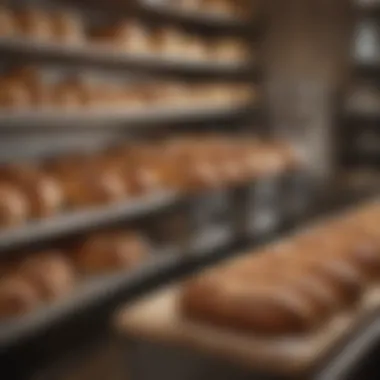
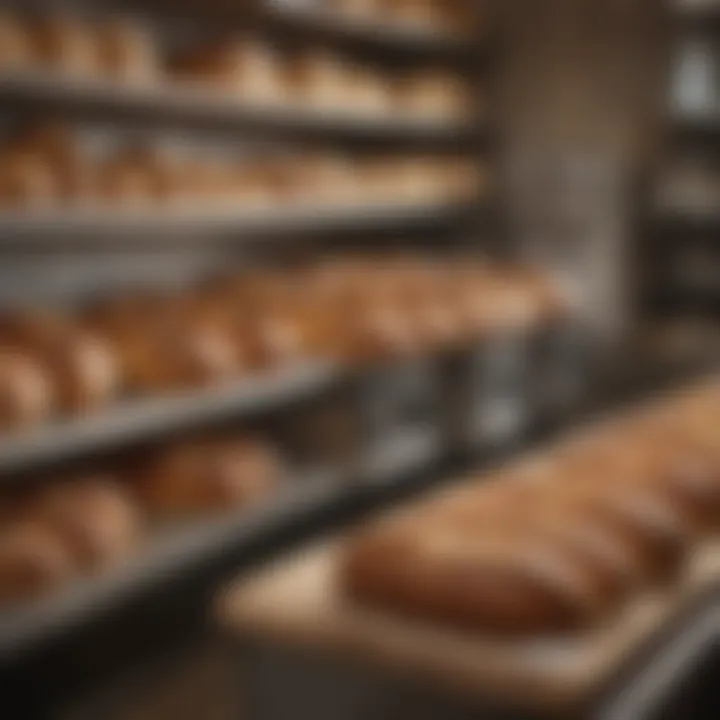
Features and Settings
The world of bread makers is riddled with various features that can be a bit overwhelming. It’s wise to understand that not all bread makers are created equal. Features can range from fewer options to a broad spectrum that includes everything from gluten-free settings to artisan bread cycles. Depending on your needs, certain functionalities may be more suitable.
Pre-set Programs
Pre-set programs are like the "easy mode" for novices and seasoned bakers alike. They allow users to select a type of bread or crust preference without having to fuss around with the specifics of ingredients or timing. This is appealing for busy folks who want a home-baked loaf with minimal effort.
The convenience factor can't be overstated. A machine with solid pre-set programs might have different settings like basic, whole wheat, or French bread, making it a jack-of-all-trades. However, be aware that sometimes these settings may not cater to unique flavors or dietary preferences; this could be a drawback if you lean towards more custom creations.
Crust Color Options
Crust color options provide a layer of customization that is often not considered until someone bites into a loaf that’s too dark or too pale for their liking. Many bread makers offer light, medium, and dark crust options. This diversity lets bakers tailor their loaf to preference and creates a satisfying culinary experience.
This specific feature shines for those who revel in the sensory delight of tasting a perfectly baked crust. Yet, it also indicates that users need to keep an eye on the baking process, as an overly toasted crust can unfortunately lead to more charred memories than lovely loaves.
Delay Timer Function
The delay timer function is perhaps one of the handiest features you can have. It lets you prepare the ingredients in advance and schedule your machine to start baking at a later time. Imagine waking up to the scent of fresh bread wafting in from the kitchen; it’s a lovely thought.
However, it’s important to note that not all doughs are suitable for delayed starts, especially those with perishable ingredients. Be cautious, and read through your machine’s guidelines to understand what works best. The timer is a convenience but does require some consideration of the food safety factors involved.
Price Range
When it’s all said and done, price will likely play a heavy role in your buying decision. Bread makers can range wildly in price—from budget options that get the job done to high-end models with advanced settings and sleek designs. It can be tempting to go for the least expensive model; however, remember that a budget machine often comes with limitations that may hinder your bread-making creativity.
Baking enthusiasts who take their craft seriously might want to invest in something that provides versatility and quality. Studying the features that justify the price tag is essential. Ultimately, a well-rounded choice is one that offers good value and a range of functions tailored to your baking needs without emptying your wallet.
Brand Reputation
Finally, the brand behind your bread maker matters. Some brands have built a reputation over the years and are esteemed for dependability, customer support, and product quality. It is worth taking a bit of time to read up on consumers' experiences and reviews before making a decision.
Brands like Panasonic, Cuisinart, and Zojirushi lead the market and have solid followings for a good reason. They have a history of creating machines that not only bake well but also come with features that truly assist in the bread-making journey. Opting for a reputable brand could save you from hiccups in your baking saga down the line.
Where to Buy a Bread Maker
Finding the right place to buy a bread maker can be as important as the bread maker itself. With an array of choices, the decision can feel a bit overwhelming. But it’s quite essential to weigh the options carefully, as each venue can offer unique benefits or drawbacks that affect the overall purchase experience. Are you looking for convenience, variety, potentially lower prices, or hands-on assistance? Knowing where to buy a bread maker leads to informed decisions that can enhance your baking journey.
Online Retailers
Buying online has transformed the shopping experience for many consumers. Here are a few avenues to explore.
Amazon
A giant in the online shopping realm, Amazon boasts a staggering selection of bread makers. The key characteristic of this retailer is its vast inventory, which means you can find almost any model that’s on the market. It also benefits from user reviews, allowing shoppers to read firsthand experiences.
What makes Amazon particularly beneficial is the Prime membership. This allows for quick shipping and often competitive prices, which can sway your decision.
However, a unique feature of Amazon is the return policy. Despite its perks, the downside might be the overwhelming number of choices that could lead to decision fatigue. Furthermore, not all products come with the same level of assurance regarding quality, as items could be shipped directly from third-party vendors.
eBay
eBay can be a treasure trove for bargain hunters searching for bread makers, especially if you are looking for used equipment. The key characteristic of eBay is its auction format, which offers buyers the chance to snag a deal. You might find a high-quality bread maker at a fraction of the retail price, making it an appealing option for budget-conscious cooks.
What sets eBay apart is the possibility to bid on items, potentially lowering costs even further.
However, buyer beware: the risk lies in the unknown condition of used bread makers and possibly less robust seller support compared to larger retailers. It’s crucial to check seller ratings and reviews to ensure you’re making a sound investment.
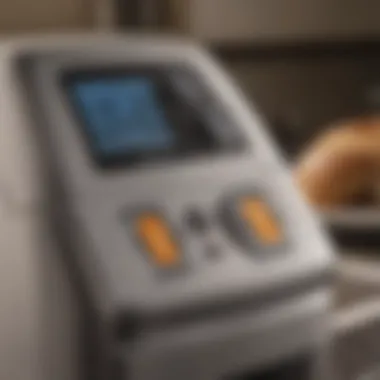
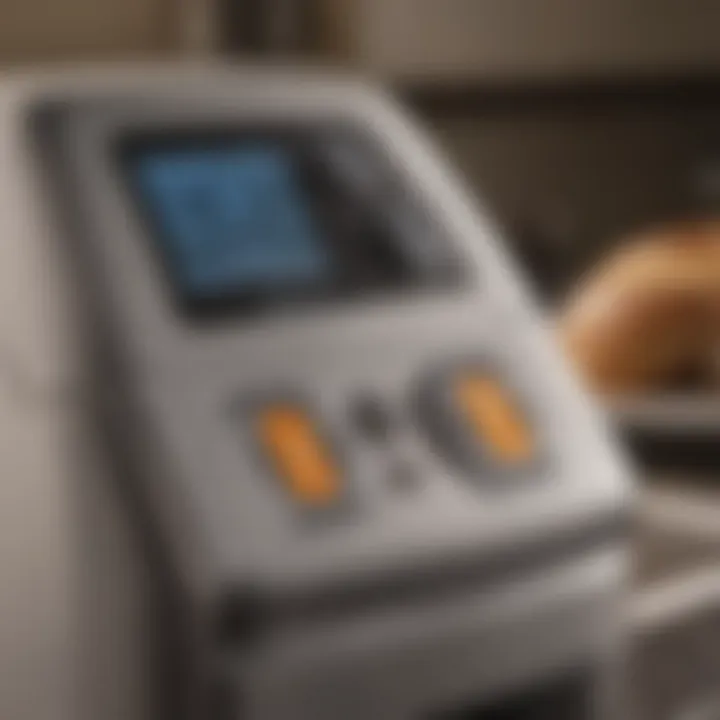
Specialty Kitchen Stores
For enthusiasts who appreciate quality and expert advice, specialty kitchen stores provide a more personal touch. The key characteristic of these stores is their focus on kitchen equipment, often staffed by people who know their products well and can offer tailored advice. It’s an excellent environment for discussing which bread maker suits your baking needs best.
These shops may not have the same depth of inventory as online behemoths but can provide a beneficial, hands-on experience. You can often see the models in action before making a decision.
On the flip side, prices may be higher due to the personalized service and quality of the products. Nonetheless, if you value expert guidance, the trade-off may very well be worth it.
Physical Stores
While online shopping is all the rage, don't count out brick-and-mortar options. Sometimes touching and observing can make a world of difference.
Department Stores
Department stores often have a home goods section featuring bread makers. The key characteristic of these stores is their accessibility. You likely already have an idea of your local department store's layout, making it easy to pop in and check out the options.
They typically carry a range of brands and models. It’s beneficial for those who want to take the bread maker home right away without waiting for shipping.
However, selection may be limited compared to specialized stores or online platforms, meaning you might not find every model available in the market.
Home Improvement Stores
To some, it may sound surprising, but home improvement stores like Home Depot sometimes carry kitchen appliances. The unique aspect of visiting one of these locations is that you can mix shopping for a bread maker with other home improvement needs.
A key characteristic is the often competitive pricing on appliances, including bread makers. This multipurpose shopping experience is one that can save time.
The downside, however, can be knowledge. Staff may not always have detailed expertise about kitchen appliances and may not offer you the advice you would get from a specialty kitchen store.
Specialty Kitchenware Shops
These shops specialize in all things culinary. Key characteristics of specialty kitchenware shops include their focused range of products and expert salespeople who are well-versed in what they sell. Walking into one of these boutiques provides an inviting atmosphere filled with various gadgets and appliances to inspire your cooking endeavors.
It’s certainly a beneficial stop for finding high-end bread makers and getting personalized recommendations.
However, prices at specialty shops can be on the higher side due to their unique inventory and knowledgeable staff. Ultimately, if value expertise and quality over price, this is where you would want to shop.
Comparison of Online and Offline Options
Choosing between online and offline shopping really depends on your preferences. Online shopping offers a broader selection and often more competitive prices but might skimp on the customer service touch that physical stores provide.
Just keep in mind that online convenience can come at the cost of being unable to physically inspect the product before purchase. Evaluating user reviews can help ease this concern, but it won't replace the tactile experience of handling a bread maker.
Evaluating Bread Maker Reviews
When it comes to making a smart decision on which bread maker to purchase, being savvy about user reviews is crucial. No one wants to shell out good money only to end up with a machine that just doesn’t cut the mustard. Evaluating bread maker reviews can provide insight into the functionality of a model, its ease of use, and reliability, thus empowering consumers to make well-informed choices.
Understanding both consumer and expert feedback gives an extensive viewpoint on what one can genuinely expect. User experiences often highlight practical day-to-day usage that specifications might overlook. Additionally, expert reviews can sometimes offer a more critical analysis of the machine's features and performance.
With numerous options in the market, given the variety of brands and models, evaluating reviews becomes a guiding light. This section aims to dissect two primary sources of insights: user feedback and expert analysis.
Understanding User Feedback
It’s one thing to read what a product claims it can do, but it's quite another to see how well it performs in real-world scenarios. User feedback sheds light on several aspects of a bread maker that specs alone can’t convey.
- Functionality: Many users share their experiences regarding how well the machine handles various types of bread, from whole grain to gluten-free.
- Ease of Use: User reviews often detail the learning curve or nuances in operating the machine. This is helpful to identify if a newbie could easily whip up some bread or if it requires a degree in engineering.
- Durability and Longevity: Long-term users can speak to how well the bread maker has held up over time. Did it stand the test of time, or did it croak after a few months?


Incorporating this feedback enables potential buyers to gauge whether the bread maker is suited to their specific needs and baking aspirations. Plus, seeing a recurring complaint can signal a possible design flaw, while applause for a feature can further cement your choice.
Expert Reviews vs. Consumer Reviews
While consumer insights are invaluable, expert reviews should not be overlooked. Experts typically conduct thorough evaluations based on testing a machine's capabilities in various conditions. Differences between these reviews can shape your decision-making process.
- Depth of Analysis: Experts usually provide detailed breakdowns of features, from basic functions to advanced settings. They dissect elements such as kneading efficiency, temperature control, and baking quality.
- Comparative Evaluations: Experts often compare models side by side, giving perspective on how a specific bread maker measures up against the competition, which can be a game-changer for readers.
- Technical Terminology: They usually delve into specifics that consumers may not have considered, such as the mechanics behind certain settings. While some may find this overwhelming, it can reveal critical nuances that influence buying decisions.
"Choosing wisely based on firsthand accounts and expert opinions can truly define your home-baking experience. You don’t want to be stuck with a bread maker that turns out rock-hard loaves instead of melt-in-your-mouth goodness!"
By synthesizing these insights, you are paving the way towards an informed purchase, one that resonates with your personal baking journey.
Post-Purchase Considerations
Making an investment in a bread maker is like striking gold for many home bakers and culinary enthusiasts. But just as important as the initial purchase is what comes afterward. Post-purchase considerations can often be the icing on the cake, ensuring that your bread maker doesn’t just collect dust in a cupboard but remains a cherished tool in your kitchen arsenal. Let's dive deeper into the essentials that come into play once the transaction is complete.
Warranties and Guarantees
When buying a bread maker, the warranty and guarantee are key elements that shouldn't be overlooked. It’s one of those things that might feel secondary to the actual making of bread but can save you a lot of hassle down the line.
Typically, manufacturers offer warranties that cover parts and labor for a certain period after purchase. For instance, many high-quality bread makers come with a two-year warranty, while some premium models might even extend that up to five years. This means if something goes awry—be it a faulty motor or issues with the heating elements—you aren’t left holding the bag.
Having a warranty is akin to having a safety net. Not only does it give you peace of mind, but it also showcases the manufacturer’s confidence in their product. Make sure to read the fine print to understand what is covered. Sometimes, warranties may not cover certain mishaps caused by user error, such as overloading the machine. Knowing these nuances ahead of time will prep you for any trouble.
Customer Support Resources
Let’s face it, no one enjoys staring at a user manual like it’s a Shakespearean drama. But sometimes, that’s just what you have to do! That’s where robust customer support comes into play. Good support resources can transform a stressful baking experience into a smooth operation.
Most manufacturers provide a range of support options such as live chat, phone support, and email assistance. Having access to FAQ sections and troubleshooting guides on their websites is also a major plus. If you encounter a problem, you shouldn't have to jump through hoops to get help. Consider brands known for their stellar customer service; they can make all the difference.
Furthermore, joining online communities or forums on platforms like Reddit can be extremely beneficial. Discussions on troubleshooting, recipes, and product experiences enrich your bread-making journey. It’s like having a buddy system in the kitchen, where each question can lead to a treasure trove of insights from fellow bakers.
Maintenance and Care
Once you have your bread maker, its longevity depends on how you care for it. Think of regular maintenance as preventive medicine for your machine. A little love goes a long way in ensuring it keeps performing at its best.
Firstly, always clean the bread pan and kneading blade after each use. A quick wash with warm soapy water keeps crumbs at bay and prevents residue build-up, which could affect the flavor of future loaves. Just don’t forget to check if any parts are dishwasher safe before tossing them in!
Also, pay attention to the exterior. Wipe it down to remove any flour dust or spills. It not only looks nicer but prevents any sticky mess from mingling with your next baking adventure. If the model has a removable lid, make sure to regularly check it seals correctly, as a loose lid can lead to uneven baking.
Here are some quick maintenance tips:
- Inspect the power cord for damage regularly.
- Calibrate timers and settings every few months to ensure precision.
- Refer to the manual for specific maintenance recommendations unique to your model.
By proactively caring for your bread maker, you set the stage for countless delicious loaves in the future, enhancing your overall experience.
"An ounce of prevention is worth a pound of cure." - Benjamin Franklin
In summary, the post-purchase phase is entirely as crucial as the initial buying decision. A good warranty, reliable customer support, and diligent maintenance can turn your bread maker from just another appliance into a beloved partner in your baking endeavors.
Finale
As we draw our discussion to a close, it’s vital to recognize the meaningful nature of purchashing a bread maker. This isn’t just about buying a kitchen appliance; it’s a stride towards crafting your own bread, filled with the aroma of home and heart. Having the ability to create your own loaves allows for a personal touch—consider the joy of serving a fresh loaf at a family gathering or the scrumptious sandwiches that become an everyday delight.
The importance of the conclusion section lies in summarizing pertinent points discussed throughout the article, echoing the factors that lead to a smart buying decision:
- Assess your needs: Consider what you want from a bread maker. Are you after something basic or do you desire advanced features?
- Evaluate options: Analyze various retailers, both online and offline. Each choice has its own set of pros and cons, and knowing these can lead you to that perfect bread maker.
- Understand what you’re spending on: Don't let price tags dictate your decision; rather, think about the value of freshness and quality ingredients at your fingertips.
- Look into support: A good, reliable warranty and customer service can save you a lot of hassle down the line.
"Investing in a bread maker is akin to investing in culinary experiences; the rewards unfold each time you slice through those warm, home-baked creations."
Ultimately, whether you're a seasoned baker or a novice ready to explore, this guide is intended to empower you with knowledge. After weighing all the possibilities—from brands to retailers, reviews, and post-purchase considerations, you can step into the world of artisanal bread making with confidence.
The journey doesn’t end with the purchase, as continuous experimentation and learning are just around the corner. Your bread maker is more than an appliance; it’s a tool that encourages creativity and nurtures a love for homemade goodness that can truly transform your culinary life.



